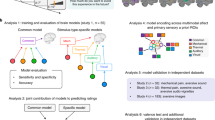Abstract
An experiment was conducted to determine if the relatively strong negative affect generated by anticipation of pain from exposure to aversive stimulation would give rise to an instigation to aggression and accompanying feelings of annoyance-irritation-anger. The 45 undergraduate women in the study were required to immerse their nondominant hand in water as they administered reward and punishment to a fellow student, supposedly as an evaluation of that person's solutions to assigned problems. In two-thirds of the cases the water temperature was unpleasantly cold, while it was much more tolerable in temperature for the remaining subjects. Half of the participants in the cold water condition and all of those in the more tolerable water temperature group has been led to expect the possibility of pain as they kept their hand in the water, whereas the remaining women (exposed to the cold water) had been alerted only to the physical sensations they would have. In accord with the findings obtained in an earlier experiment by Leventhal, Brown, Sacham, and Enquist (1979), the subjects in the cold water group expecting that they might feel pain reported experiencing the greatest discomfort. Further, consistent with Berkowitz's analysis of anger and angry aggression, these participants also reported the strongest feelings of annoyance-irritation-anger and were most punitive to the available target even though they could not attribute their discomfort to this person.
Similar content being viewed by others
References
Averill, J. (1982).Anger and aggression: An essay on emotion. New York: Springer-Verlag.
Bandura, A. (1973).Aggression: A social learning analysis. Englewood Cliffs, New Jersey: Prentice-Hall.
Baron, R. (1977).Human aggression. New York: Plenum.
Berkowitz, L. (1983a). Aversively stimulated aggression.American Psychologist, 38 1135–1144.
Berkowitz, L. (1983b). The experience of anger as a parallel process in the display of impulsive, “angry” aggression. In R. Geen & E. Donnerstein (Eds.),Aggression: Theoretical and empirical reviews. New York: Academic Press.
Berkowitz, L., Cochran, S., & Embree, M. (1981). Physical pain and the goal of aversively stimulated aggression.Journal of Personality and Social Psychology, 40 687–700.
Blanchard, R., Blanchard, D., & Takahashi, L. (1978). Pian and aggression in the rat.Behavioral Biology, 23 291–305.
Leventhal, H., Brown, D., Sacham, S., & Enquist, S. (1979). The effects of preparatory information about sensations, threat of pain, and attention on cold pressor distress.Journal of Personality and Social Psychology, 37 970–985.
Miller, S. (1981). Predictability and human stress: Toward a clarification of evidence and theory. In L. Berkowitz (Ed.),Advances in experimental social psychology (Vol. 14). New York: Academic Press.
Moyer, K. (1976).The psychobiology of aggression. New York: Harper & Row.
Potegal, M. (1979). The reinforcing value of several types of aggressive behavior: A review.Aggressive Behavior, 5 353–373.
Turner, C., & Simons, L. (1974). Effects of subject sophistication and evaluation apprehension on aggressive responses to weapons.Journal of Personality and Social Psychology, 30 341–348.
Weiner, B. (1985). An attributional theory of achievement motivation and emotion.Psychological Review, 92 548–573.
Zillmann, D. (1979).Hostility and aggression. Hillsdale, New Jersey: Erlbaum.
Author information
Authors and Affiliations
Rights and permissions
About this article
Cite this article
Berkowitz, L., Thome, P.R. Pain expectation, negative affect, and angry aggression. Motiv Emot 11, 183–193 (1987). https://doi.org/10.1007/BF00992343
Issue Date:
DOI: https://doi.org/10.1007/BF00992343




